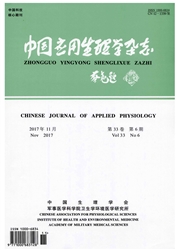

 中文摘要:
中文摘要:
目的:探讨槟榔碱对2型糖尿病大鼠肝脏胰岛素抵抗的影响及其机制。方法:采用高果糖饲料饲养Wistar大鼠12周制备2型糖尿病大鼠模型,实验动物随机分为5组(n=8):对照组、模型组、模型+不同浓度的槟榔碱(0,0.5,1,5mg/kg)组。4周后通过检测血糖、血脂、胰岛素、RT-PCR检测肝脏组成型雄甾烷受体(CAR)、孕甾烷x受体(PXR)、糖代谢相关基因:葡萄糖-6-磷酸酶(G6Pase)、磷酸烯醇式丙酮酸羧激酶(PEPCK)和炎症相关因子:白细胞介素-6(IL-6)、肿瘤坏死因子α(TNF-α)mRNA表达,Western blot检测大鼠肝内p-AKT和葡萄糖转运体4(GLUT4)蛋白表达。结果:1,5mg/kg槟榔碱显著降低糖尿病大鼠体重、空腹血糖、空腹胰岛素、血脂和糖代谢相关基因及炎症相关因子mRNA水平,提高CAR、PXR mRNA水平及p-AKT、GLUT4蛋白水平。结论:槟榔碱可能通过提高CAR和PXR的表达,导致肝脏糖代谢关键酶PEPCK、G6Pase基因表达或者炎性因子肿瘤坏死因子-α(TNF-α)、白介素-6(n-6)表达降低,改善2型糖尿病大鼠肝脏胰岛素抵抗。
 英文摘要:
英文摘要:
Objective: To explore the effects of arecohne on hepatic insulin resistance in type 2 diabetes rats and to elucidate its possible mechanism. Methods: Forty five Wistar rats were fed with high fructose diet for 12 weeks to induce type 2 diabetic rat model, rats were randomly divided into 5 groups( n = 8) : control group, model group and model group were treated with different dose (0,0.5, 1,5 mg/kg) of arecoline. After 4 weeks, the fasting blood glucose, blood lipid and insulin level measured , mRNA expression of liver constitutive androstane receptor (CAR), pregnane X receptor (PXR), glucose-6-phosphatase (G6Pase), phosphoenolpyruvate carboxykinase (PEPCK), interleukin- 6 (IL-6) and tumor necrosis factor-alpha (TNF-α) were detected by reverse transcription polymerase chain reaction (RT-PCR), the protein expression of p-AKT and glucose transporter4 (GLUT4) were detected by Western blot. Results: 1,5 mg/kg arecoline could significantly decrease the level of fasting blood glucose , blood lipid , blood insulin level and liver G6Pase , PEPCK, ID6, TNF-α mRNA level in type 2 diabetes rats. 1,5 mg/kg arecoline also could significantly increase CAR, PXR mRNA level and p-AKT and GLUT4 protein expression. Conclusion: Arecoline improved hepatic insulin resistance in type 2 diabetes rats by increasing the mRNA levels of CAR and PXR leading to the decreased glucose metabolism and inflammation related genes expression.
 同期刊论文项目
同期刊论文项目
 同项目期刊论文
同项目期刊论文
 Arecoline improves vascular endothelial function in high fructose-fed rats via increasing cystathion
Arecoline improves vascular endothelial function in high fructose-fed rats via increasing cystathion 期刊信息
期刊信息
